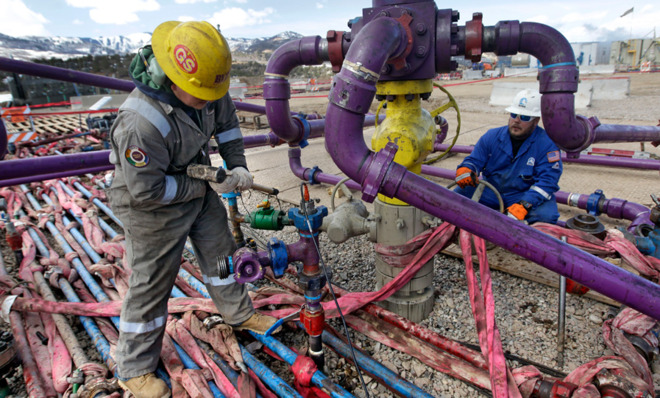Study: Living near a fracking well may increase the risk of birth defects
The latest research is cause for concern, but more is needed

A free daily email with the biggest news stories of the day – and the best features from TheWeek.com
You are now subscribed
Your newsletter sign-up was successful
A new study in Colorado by the National Institute of Environmental Health Sciences found that mothers living near hydraulic fracturing — commonly known as fracking — wells were up to 30 percent more likely to give birth to newborns with congenital heart defects.
Now, correlation does not imply causation. This means that more studies in lots of other geographic areas are necessary to determine whether this is a real association or just an unfortunate coincidence. The fracking industry points to a list of studies that have shown no health impact from fracking (although none of these studies looked at data on birth defects). It is also not yet possible to assess data on long-term health impacts, if only because fracking has not been around long enough.
But the possibility of birth defects due to fracking is still an uncomfortable finding. Five years ago, America produced around five million barrels of oil per day; today that number has risen to seven million, an increase caused largely by an explosion of fracking that has lifted the economy by up to $1200 per household. More than 15 million Americans now live within a mile of a well.
The Week
Escape your echo chamber. Get the facts behind the news, plus analysis from multiple perspectives.

Sign up for The Week's Free Newsletters
From our morning news briefing to a weekly Good News Newsletter, get the best of The Week delivered directly to your inbox.
From our morning news briefing to a weekly Good News Newsletter, get the best of The Week delivered directly to your inbox.
Fracking extracts gas by digging a well close to an underground deposit and then pumping a mixture of sand, water, and chemicals at high pressure to release the gas trapped there.
It is these chemicals that may be the culprit here. "[M]ore than 700 chemicals are used in the fracking process, and many of them disturb hormone function," says Susan C. Nagel of the University of Missouri School of Medicine, who recently published another study showing that in Colorado, endocrine-disrupting chemicals are found in higher concentrations in the groundwater near fracking sites.
Some of the chemicals used in fracking — for example, toluene, xylenes, and benzene — are suspected of causing tumors and other mutations in humans and are known to cross the placenta, raising the possibility of fetal exposure.
While it is important to emphasize that further research is necessary to prove or disprove the link, this preliminary research raises a big concern for expecting mothers or couples trying for a baby.
A free daily email with the biggest news stories of the day – and the best features from TheWeek.com
In the longer term, if an association between birth defects (or other health ailments) and fracking can be proven, finding and eliminating the chemical or chemicals responsible could be difficult because fracking uses so many. This means that a proven association between fracking and birth defects could raise the economically ugly spectre of the end of fracking — either via bans, or due to lawsuits from the parents of children who suffered a birth defect. In that case, America will likely have to look elsewhere for an energy boom.
John Aziz is the economics and business correspondent at TheWeek.com. He is also an associate editor at Pieria.co.uk. Previously his work has appeared on Business Insider, Zero Hedge, and Noahpinion.